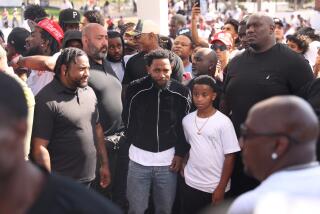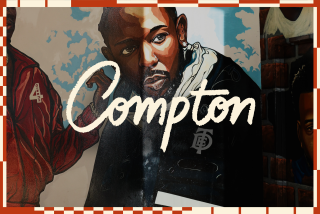Singer, Mayor Rap Up a Compromise : Music: Compton official sits down with Eazy-E to ensure that a video will portray the city in a positive light. He also apologizes for anti-Semitic remarks.
- Share via
A smiling Mayor Omar Bradley appeared Wednesday with rap star Eazy-E to announce a new pro-Compton video project and, at the same time, to apologize for anti-Semitic remarks he made during an emotional City Council debate the night before.
The Simon Wisenthal Center and the Anti-Defamation League both called on Bradley to apologize after the mayor said that those destroying the black community were “having a bar mitzvah at the same time.”
For the record:
12:00 a.m. Oct. 15, 1993 For the Record
Los Angeles Times Friday October 15, 1993 Home Edition Metro Part B Page 3 Column 6 Metro Desk 1 inches; 23 words Type of Material: Correction
Rap video--An article Thursday on rap singer Eazy-E’s attempt to make a video in Compton incorrectly reported the name of his record company. It is Ruthless Records.
“While I apologize for the use of the word bar mitzvah,” Bradley said Wednesday morning, “it is still true that the majority of these black exploitation films and music videos are controlled by non-African-Americans, and are, in fact, controlled by people of the Jewish faith.”
But later, during a news conference, Bradley offered more of an apology, saying he “would also like to apologize for any comments made that were anti-Semitic or hurt the Jewish faith or Jewish people in any way.”
Rabbi Marvin Hier of the Simon Wisenthal Center and David A. Lehrer, executive director of the Anti-Defamation League, said the second apology was acceptable.
“I’m happy he faced up to it. It was the least he could do under the circumstances,” said Hier, who earlier in the day called on Bradley to apologize or resign immediately. “The public has a right to demand from elected officials a higher standard of moral behavior.”
In fact, it was Bradley’s call for Eazy-E to exhibit a higher moral standard that prompted the controversial remarks.
The musician, whose real name is Eric Wright, had approached the council seeking to overturn Police Chief Hourie Taylor’s decision to deny a filming permit. The video, titled “Real Compton City G’s,” was scheduled to be filmed last weekend, but Taylor vetoed the plan, saying it would be detrimental to the city.
The council at first appeared to agree with Taylor. For 90 minutes, the council and Bradley berated Wright, fellow songwriter Andre Wicker--also known as Gangsta Dresta--and video director Marty Thomas for portraying black life and the city in a derogatory manner.
Wright, formerly of the rap group N.W.A., whose 1989 album “Straight Outta Compton” sold 3 million copies and popularized so-called gangsta rap, often includes violent images in his work and uses derogatory names for blacks and women.
Wright and Wicker defended their work, saying it depicted reality and contending that it had “put Compton on the map.” But council members, often shouting, said Wright had defamed the city and its people.
During the debate, Bradley berated Wright for “not even having the courtesy to hire black people to direct or orchestrate” the film he wants to make. The mayor then intimated that Jews are making money off videos showing negative images of blacks and the city.
“Whatever his motivations, casting Jews in the role of exploiters is outrageous and is the worst kind of stereotyping, typical of such Nazi leaders as Joseph Goebbels and Julius Streicher,” Hier said.
After his angry rhetoric at the meeting, Bradley met with Wright and Wicker later Tuesday night to rework the project in a way that will offer a more positive image of Compton. That meeting took place without Thomas, who is white, because Wright’s record label, Reckless Records, decided that no white people should attend.
After a second meeting Wednesday, Bradley said a preliminary deal had been worked out to film the video in Compton.
The new video, “Yellow Brick Road to Compton,” will show the city and its inhabitants in a positive light, Bradley said.
Asked at the news conference if he would stop using derogatory terms for blacks and women in future rap songs, Wright said: “Eazy-E is going to remain Eazy-E. But I will not portray Compton as a bad city. Compton is my city.”
More to Read
Sign up for Essential California
The most important California stories and recommendations in your inbox every morning.
You may occasionally receive promotional content from the Los Angeles Times.










